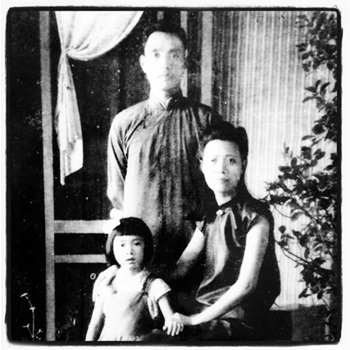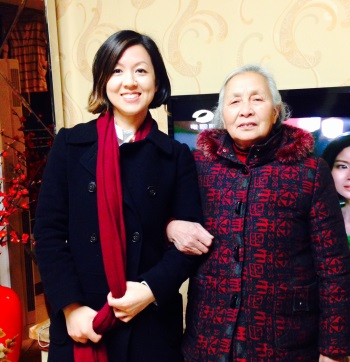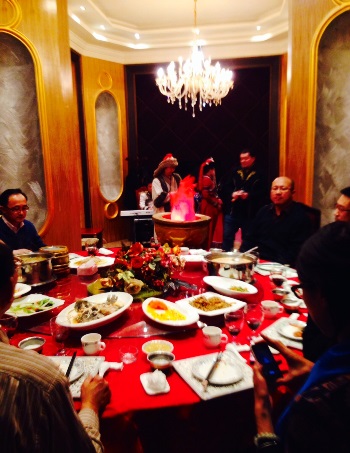25.03.14
In the second of our series of posts from Jenevieve Chang, she pieces together her family history and makes sense of her urgent need for storytelling.
Being back in China as I recount what I know, and write more of what I remember, gaps and gaps of knowledge continue to reveal themselves, and I find myself running to catch up. At some stage, imagination will have to help me to the finish line.
 |
|
My Aunt with her parents, circa 1945 |
What I do know is this: Grandfather fled China in 1949 during the chaotic aftermath of the Communists’ war victory. But he left his eight year old daughter behind. “We couldn’t bring her with us on the plane,” my grandfather would say, tears in his eyes even after the long passage of time. “She was deep in the countryside and there was no time to fetch her.” My grandfather did not know that it would be another 43 years before he could contact her again because of the Government freeze-out.
When both finally realized that the other was still alive, their relationship became a closely guarded sanctuary where painful disclosures were revealed and emotional scars were healed through letters, photos and stories. Information was slowly drip-fed to me as I was growing up: My great grandparents perished during the Great Chinese Famine. My Aunt was married off at a young age to ensure her survival. The family suffered at the hands of the Cultural Revolution. In China this strand of my family story is tragic, but not uncommon. What is less common in China is openly sharing this story in front of an audience. The reactions I have encountered here have run the gamut from uncomfortably personal: (“Will you have children yourself one day?”) to intensely confrontational: (“How do you feel about the life choices you’ve had when your aunt was trapped in China?”), propelling the louder drumming of my own self-enquiry: “Why tell these stories?” It is hard, and sometimes it hurts.
A fortnight ago, I met my long lost Aunt for the first time in Hunan–near the same village she was left behind in. She is now 75 years old. After I showed her our family story as I understood it to be, she said “You’re missing something,” and she returned with photographs of herself as a child. And I realized that she wanted my act of remembering and sharing to forever be fused with our meeting. She wanted a memento of her innocence to be preserved in the minds of the audience even as they discovered what happened next. She wanted me to remember better, and use my imagination more wisely.
 |
|
The day I met my Aunt, circa 2014. |
The following week, I was in Inner Mongolia – where the collapse of a nomadic way of life in favour of rapid urbanization is one of the most stark in the country. At a meeting with the Mongolian Writers’ Association, I asked the same question I had been asking myself of late, and one of the writers replied “Our writing is characterized by our longing for our old way of life, our life in the grasslands, what is disappearing and what we need to keep close, by writing. I don’t want to forget. Our history must be known by the next generation.”
Hearing this, I felt fortified, knowing that deep down my real reason for writing is also to keep things close, to reduce the gap between longing and remembering and to extinguish the ignorance of forgetting. Even -or especially– if hard questions get asked along the way.
 |
|
Mongolian-style hospitality: traditional song and story and lots of food. |
Jenevieve Chang, March 2014

